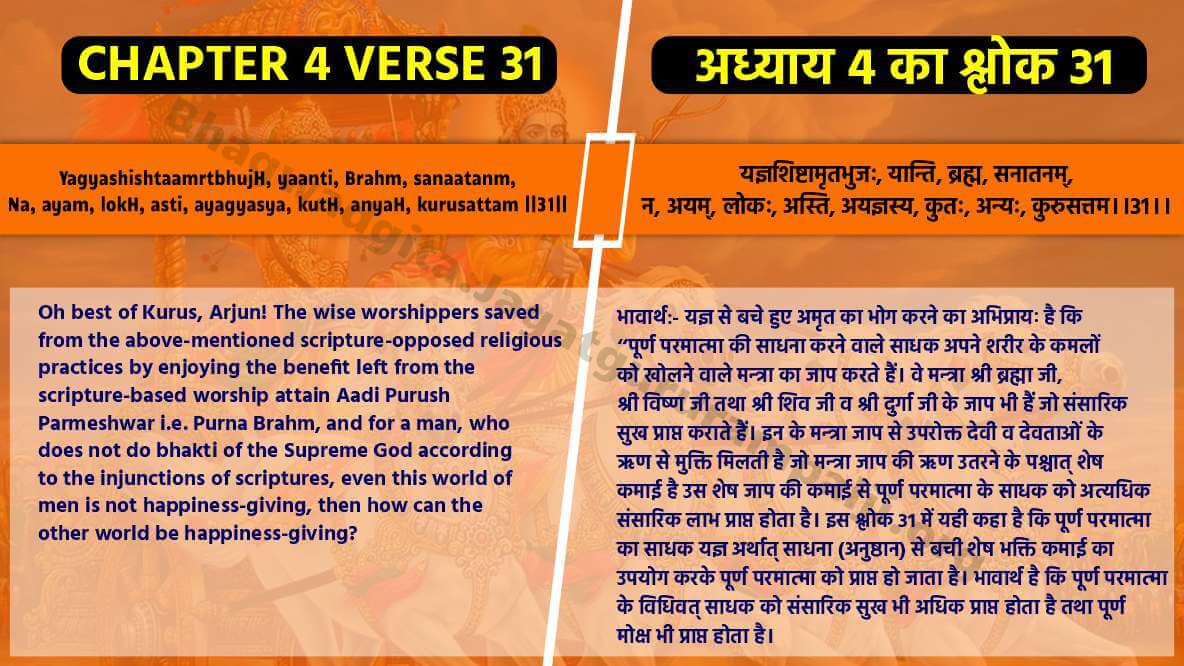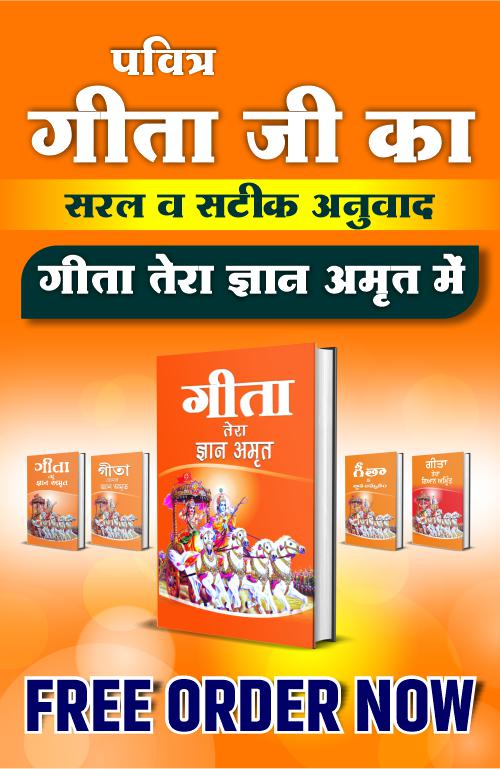
YagyashishtaamrtbhujH, yaanti, Brahm, sanaatanm,
Na, ayam, lokH, asti, ayagyasya, kutH, anyaH, kurusattam ||31||
Translation: (Kurusattam) O best of Kurus, Arjun! (yagyashishtaamrtbhujH) the wise worshippers saved from the above-mentioned scripture-opposed religious practices by enjoying the benefit left from the scripture-based worship (sanaatanm brahm) Aadi Purush Parmeshwar i.e. Purna Brahm/the Supreme God (yaanti) attain and (ayagyasya) for a man who does not do bhakti of the Supreme God according to the injunctions of the scriptures (ayam) this (lokH) world of men/Earth also happiness-giving (na) not (asti) is then (anyaH) Parlok/other world (kutH) how can be happiness-giving? (31)
Translation
O best of Kurus, Arjun! The wise worshippers saved from the above-mentioned scripture-opposed religious practices by enjoying the benefit left from the scripture-based worship attain Aadi Purush Parmeshwar i.e. Purna Brahm, and for a man, who does not do bhakti of the Supreme God according to the injunctions of scriptures, even this world of men is not happiness-giving, then how can the other world be happiness-giving?
Meaning
The purport of enjoying the nectar/benefit left over from the yagya is that the worshippers who worship Purna Parmatma do jaap of mantra which opens the lotuses in their bodies. Those mantras are also jaap of Shri Brahma ji, Shri Vishnu ji and Shri Shiv ji and Shri Durga ji, which makes one attain worldly comforts. By jaap of these one becomes free from the debt of the above-mentioned gods and goddesses. After paying the debt of mantra-jaap, the residual earning of jaap which is left, a worshipper of Purna Parmatma attains a lot of worldly benefits from it. In this Shlok 31, this only has been said that a worshipper of Purna Parmatma by using the residual earning of bhakti from the yagya i.e. sadhna (rite) attains Purna Parmatma. The meaning is that a worshipper who worships Purna Parmatma according to the rule gets more worldly comforts as well as complete salvation.
Important – This very evidence is mentioned in Holy Gita Adhyay 3 Shlok 13 and also in Adhyay 16 Shlok 23-24 that oh Bharat, those devotees who abandoning the injunctions of the scriptures follow arbitrary behaviour i.e. arbitrary way of worship, they neither attain any happiness, nor spiritual success, nor any destination. In other words it is useless. Therefore, it is beneficial to only follow whatever is ordained in the scriptures i.e. Vedas regarding the acts of bhakti-sadhna which should be done and which should not be done.
यज्ञशिष्टामृृतभुजः, यान्ति, ब्रह्म, सनातनम्,
न, अयम्, लोकः, अस्ति, अयज्ञस्य, कुतः, अन्यः, कुरुसत्तम।।31।।
अनुवाद: (कुरुसत्तम) हे कुरुक्षेष्ठ अर्जुन! (यज्ञशिष्टामृतभुजः) उपरोक्त शास्त्राविधि रहित साधनाओं से बचे हुए बुद्धिमान साधक शास्त्रा अनुकूल साधना से बचे हुए लाभ को उपभोग करके (सनातनम् ब्रह्म) आदि पुरुष परमेश्वर अर्थात्-पूर्णब्रह्मको (यान्ति) प्राप्त होते हैं और (अयज्ञस्य) शास्त्रा विधि अनुसार पूर्ण प्रभु की भक्ति न करनेवाले पुरुषके लिये तो (अयम्) यह (लोकः) मनुष्य-लोक भी सुखदायक (न) नहीं (अस्ति) है फिर (अन्यः) परलोक (कुतः) कैसे सुखदायक हो सकता है?(31)
भावार्थ:- यज्ञ से बचे हुए अमृृत का भोग करने का अभिप्रायः है कि ‘‘पूर्ण परमात्मा की साधना करने वाले साधक अपने शरीर के कमलों को खोलने वाले मन्त्रा का जाप करते हैं। वे मन्त्रा श्री ब्रह्मा जी, श्री विष्ण जी तथा श्री शिव जी व श्री दुर्गा जी के जाप भी हैं जो संसारिक सुख प्राप्त कराते हैं। इन के मन्त्रा जाप से उपरोक्त देवी व देवताओं के ऋण से मुक्ति मिलती है जो मन्त्रा जाप की ऋण उतरने के पश्चात् शेष कमाई है उस शेष जाप की कमाई से पूर्ण परमात्मा के साधक को अत्यधिक संसारिक लाभ प्राप्त होता है। इस श्लोक 31 में यही कहा है कि पूर्ण परमात्मा का साधक यज्ञ अर्थात् साधना (अनुष्ठान) से बची शेष भक्ति कमाई का उपयोग करके पूर्ण परमात्मा को प्राप्त हो जाता है। भावार्थ है कि पूर्ण परमात्मा के विधिवत् साधक को संसारिक सुख भी अधिक प्राप्त होता है तथा पूर्ण मोक्ष भी प्राप्त होता है।
विशेष - यही प्रमाण पवित्रा गीता अध्याय 3 श्लोक 13 में वर्णन है तथा अध्याय 16 श्लोक 23-24 में भी है कि हे भारत जो साधक शास्त्रा विधि त्याग कर मनमाना आचरण अर्थात् मनमुखी पूजा करते हैं उनको न तो कोई सुख प्राप्त होता है, न सिद्धि तथा न ही कोई गति प्राप्त होती है अर्थात् व्यर्थ है। इसलिए शास्त्रों में अर्थात् वेदों में जो भक्ति साधना के कर्म करने का आदेश है तथा जो न करने का आदेश है वही मानना श्रेयकर है।
